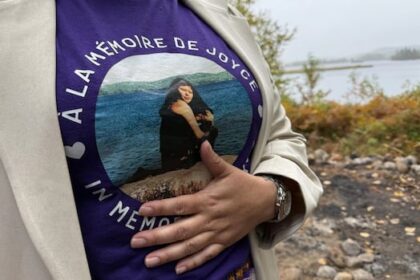ManitobaWhile the province works to decolonize the child welfare system, a dire lack of resources in the north is leaving children in care increasingly susceptible to harm and trauma, an advocate for children and youth says. Manitoba Advocate for Children and Youth wants province to step up with more funding and resourcesDave Baxter · CBC News · Posted: Aug 28, 2025 5:28 PM EDT | Last Updated: 3 hours agoSherry Gott, Manitoba’s Advocate for Children and Youth, says a dire lack of resources in northern Manitoba is leaving children in the child welfare system increasingly susceptible to harm and trauma. (Submitted by Sherry Gott)A dire lack of resources in the north is leaving children in care increasingly susceptible to harm and trauma, as the province works to decolonize the child welfare system, Manitoba’s advocate for children and youth says. “The minister keeps talking about decolonizing the system,” Sherry Gott said Wednesday, referring to Manitoba Families Minister Nahanni Fontaine. “Children can’t wait for our system to decolonize — they need supports now.” Gott said the child welfare system in northern Manitoba is currently so underfunded and underresourced that many children in the system struggle to get the supports they need.She added child placement in the north has become such a challenge that there are youth who move from placement to placement as many as 10 times while in the system.”I can tell you that many of these kids suffer from the trauma of going from placement to placement,” Gott said. Exacerbating the situation, Gott said, is the fact that children in care with conditions including physical and intellectual disabilities, autism and fetal alcohol spectrum disorder need specialized placements that are often not available in northern Manitoba. “Children have to be moved in order to have their needs met,” Gott said. “For example, for a child with autism, there’s no specialized placement in the north for children, especially in the First Nation communities.”There’s nowhere for us to place these kids, so they either have to come to Winnipeg to access the resources, or go somewhere else.”Along with challenges with placements, Gott said there is also a lack of skilled social workers in the north, and she blames some of that on what she said are low wages for those who work in that area. She is also concerned about how the lack of resources for child welfare is affecting Indigenous youth and communities, as statistics from 2024 showed approximately 91 per cent of the 8,919 children in care in Manitoba were Indigenous. In May 2024, the Manitoba government and several First Nations chiefs signed a declaration committing to transfer jurisdiction for child welfare over to First Nations, as part of their goal to decolonize the child welfare system. But Gott said there has been no noticeable improvement in child welfare services in the north since that declaration was signed, and she’s asking the province and Minister Fontaine to commit to increased funding and resources immediately. Families Minister Nahanni Fontaine, seen here speaking during a March 11 media conference, is facing criticism from Manitoba Advocate for Children and Youth Sherry Gott for the current state of the child welfare system in northern Manitoba. (Tyson Koschik/CBC)”The minister continues to say that children need to stay with their families. That’s fine, but let’s resource the communities that need them,” Gott said. She also accused Fontaine of having what she said is a disconnect with northern and remote communities and their needs. Province working to address challenges: ministerFontaine said in a statement Thursday the government is committed to doing what’s in the best interest of children and youth in the north.The minister said the government has given $4.6 million to the First Nations of Northern Manitoba CFS Authority to address challenges faced by CFS agencies, and has also increased basic maintenance rates to foster parents.”For decades, far too many children have entered into care,” Fontaine said. “That’s why we are also working closely with authorities and agencies to expand the use of new agreement types keeping children and youth out of care altogether.”Gott said she’s calling on the minister to spend more time in those communities to get a better idea of what the needs are for children in care, and for all northern residents. “I would suggest for her to go visit one of the communities in the north to see for herself the lack of resources,” Gott said. “There’s some communities that still don’t have running water, or have boil water advisories.”I think you have to be at the ground level to understand the communities, and what their needs are.”ABOUT THE AUTHORDave Baxter is an award-winning reporter and editor currently working for CBC Manitoba. Born and raised in Winnipeg, he has also previously reported for the Winnipeg Sun and the Winnipeg Free Press, as well as several rural Manitoba publications.With files from Susan Magas
Monday, 22 Dec 2025
Canada – The Illusion
Search
Have an existing account?
Sign In
© 2022 Foxiz News Network. Ruby Design Company. All Rights Reserved.
You May also Like
- More News:
- history
- Standing Bear Network
- John Gonzalez
- ᐊᔭᐦᑊ ayahp — It happened
- Creation
- Beneath the Water
- Olympic gold medal
- Jim Thorpe
- type O blood
- the bringer of life
- Raven
- Wás’agi
- NoiseCat
- 'Sugarcane'
- The rivers still sing
- ᑲᓂᐸᐏᐟ ᒪᐢᑿ
- ᐅᑳᐤ okâw — We remember
- ᐊᓂᓈᐯᐃᐧᐣ aninâpêwin — Truth
- This is what it means to be human.
- Nokoma











